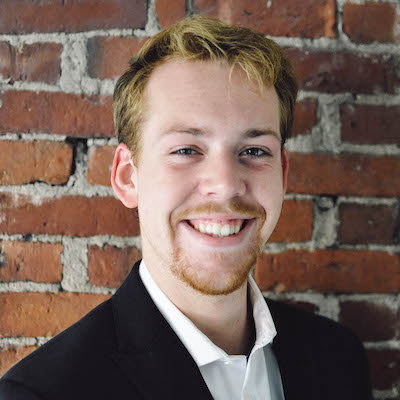
The first Center for Urban Ecology and Sustainability (CUES) lecture of the semester featured Christian Morris, a recent Suffolk University graduate. Morris presented about climate change and his work with Climate X Change, a Boston-based nonprofit, where he started working after graduating in the spring of 2020.
Originally coming to Suffolk for its business program, Morris found himself more interested in sustainable practices rather than the field itself. He switched to the College of Arts and Sciences as an environmental studies major during his second year at Suffolk.
He currently works in climate and science communications, advocating for state-level climate policy change. The goal of his work at Climate X Change is to advance climate policy around the country by working with legislators. He also works to communicate to citizens how they will be affected by climate change in a way that people can understand. He does so by creating a nexus between social and ecological issues.
One of the ways that Morris does this is by trying to get more people involved in citizen science. With citizen science, anyone is able to go into the field and gather data and draw conclusions on their research, as well as professional studies. Morris’s job is to simplify the scientific terms so that people are able to do this while having a firm understanding of the issue.
“[Climate change] is an intersectional issue,” Morris said. “There are just so many perspectives on this.”
In addition to creating a bridge for people to understand scientific jargon and concepts, Morris said his company deals with misinformation and disinformation.
“We sometimes have to deal with hit pieces in a direct way or just in a more broad sense. Like, we have to say that this is a rhetoric, that isn’t true, but has been accepted elsewhere,” Morris said.
One of the toughest parts of Morris’s job is overcoming people’s denial about climate change and pushing a sense of urgency about the issue. Not everyone is a firm believer in the science behind climate change, which makes it difficult to communicate on the issue. However, denial isn’t easy to fix, as there are communities that are more affected by the results of climate change than others. Morris said part of moving forward is integrating the principle of environmental justice.
Environmental justice aims to protect all people of all backgrounds and communities against pollution and other harmful phenomena in nature.
“[Environmental justice is] making up for years of harm that we’ve done to communities, specifically BIPOC communities,” Morris said.
Throughout America’s history, communities of color have been subject to worse environmental impacts due to environmental racism- the process of corporations placing unwanted facilities and waste in low-income, BIPOC neighborhoods. According to the Natural Resources Defense Council (NRDC), it is easier to place factories, landfills, and other unwanted infrastructure in those places due to language barriers, lack of connections to city council boards, funding issues and little general knowledge of how pollution will affect their health.
Scott Lussier, a Suffolk CUES professor, agreed that the battle against climate change is a hard one to fight, especially when taking environmental justice into account.
Lussier works mostly on GIS and drone mapping at Suffolk, which he finds is an essential tool for analyzing the impacts climate change has on our ecosystems.
“GIS stands for geographic information systems or geographic information science,” Lussier said. “It is representing data on a computerized map. We’re taking these huge data sets and displaying that information visually on a map.”
Having a connection between data and everyday citizens is essential in the fight against climate change. The visuals that scientists can present are digestible for people who might not understand everything about the issue. They can see the data points from each location as a larger frame of reference, rather than just a numerical value attached to a latitude and longitude.
Both Morris and Lussier agree that it is necessary for everyone to work together in order to achieve a sustainable future. They added that despite the challenges this poses, it will be an outcome that will be worth it for our ecosystems, our world, and our future.













